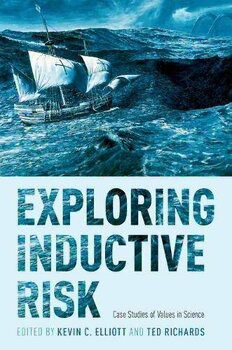
Exploring inductive risk : case studies of values in science PDF
Preview Exploring inductive risk : case studies of values in science
Exploring Inductive Risk Exploring Inductive Risk Case Studies of Values in Science Edited by KEVIN C. ELLIOTT TED RICHARDS 1 3 Oxford University Press is a department of the University of Oxford. It furthers the University’s objective of excellence in research, scholarship, and education by publishing worldwide. Oxford is a registered trade mark of Oxford University Press in the UK and certain other countries. Published in the United States of America by Oxford University Press 198 Madison Avenue, New York, NY 10016, United States of America. © Oxford University Press 2017 All rights reserved. No part of this publication may be reproduced, stored in a retrieval system, or transmitted, in any form or by any means, without the prior permission in writing of Oxford University Press, or as expressly permitted by law, by license, or under terms agreed with the appropriate reproduction rights organization. Inquiries concerning reproduction outside the scope of the above should be sent to the Rights Department, Oxford University Press, at the address above. You must not circulate this work in any other form and you must impose this same condition on any acquirer. CIP data is on file at the Library of Congress ISBN 978–0–19–046772–2 (pbk) ISBN 978–0–19–046771–5 (hbk) 9 8 7 6 5 4 3 2 1 Paperback printed by WebCom, Inc., Canada Hardback printed by Bridgeport National Bindery, Inc., United States of America To our loving and supportive (and long-s uffering and patient!) partners; when we are at risk of error, we defer to them. — KCE and TR Contents Foreword ix Heather Douglas Acknowledgments xiii List of Contributors xv 1. Exploring Inductive Risk: An Introduction— Kevin C. Elliott and Ted Richards 1 PART ONE: Weighing Inductive Risk 2. Drug Regulation and the Inductive Risk Calculus— Jacob Stegenga 17 3. D ecisions, Decisions: Inductive Risk and the Higgs Boson—K ent W. Staley 37 PART TWO: Evading Inductive Risk 4. Dual- Use Research and Inductive Risk—D avid B. Resnik 59 5. Making Uncertainties Explicit: The Jeffreyan Value- Free Ideal and Its Limits—D avid M. Frank 79 6. Inductive Risk, Deferred Decisions, and Climate Science Advising— Joyce C. Havstad and Matthew J. Brown 101 viii Contents PART THREE: The Breadth of Inductive Risk 7. Measuring Inequality: The Roles of Values and Inductive Risk— Robin Andreasen and Heather Doty 127 8. Safe or Sorry? Cancer Screening and Inductive Risk— Anya Plutynski 149 9. Inductive Risk and Values in Composite Outcome Measures— Roger Stanev 171 10. Inductive Risk and the Role of Values in Clinical Trials— Robyn Bluhm 193 PART FOUR: Exploring the Limits of Inductive Risk 11. The Geography of Epistemic Risk— Justin B. Biddle and Rebecca Kukla 215 12. The Inductive Risk of “Demasculinization”— Jack Powers 239 13. Exploring Inductive Risk: Future Questions— Kevin C. Elliott and Ted Richards 261 Index 279 Foreword What is inductive risk? Inductive risk is the chance, the pervasive possi- bility, of getting it wrong in an inductive context. Scientific inquiry always takes place in an inductive context, even if sometimes deductive reasoning is also useful. In general, decisions in science are not determined by the ev- idence available. When you make a decision in science— about how to con- duct a research project, how to characterize data, which background pieces of information to accept as stable, whether the data sufficiently support the study’s claim— you incur a risk that your decision is epistemically mistaken. Scientists have lots of ways of managing this risk, but it is an endemic feature of scientific practice. I first came across the term when writing my dissertation. For that pro- ject, I examined why experts disagreed in their interpretation of toxicological, epidemiological, and biochemical studies of dioxins. I noted that different experts seemed to have different concerns about which errors (e.g., false posi- tives or false negatives) to more carefully avoid and thus different standards for what counted as sufficient evidence for a claim of health risks from diox- ins. In their own discussions of their work, experts’ different standards arose from different concerns regarding overregulation or underregulation. My fellow graduate student Erik Angner, in hearing about my work, suggested I look at Carl Hempel’s 1960 essay “Science and Human Values” (republished in his foundational collection of papers, Aspects of Scientific Explanation) for a similar argument regarding values in science. Hempel’s wide- ranging essay examines the complex relationship between values and science, including how science can influence values and values can influence science. Regarding the latter, Hempel noted that values can offer no confirmatory weight to scientific claims. But he argued that values do have a role to play in the acceptance of scientific claims. Values are important for the
